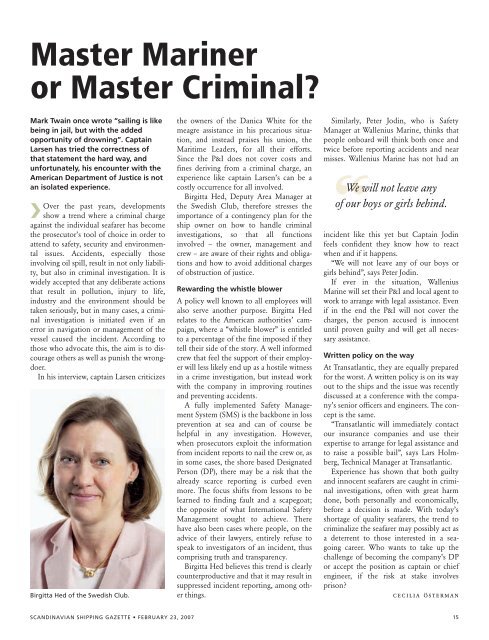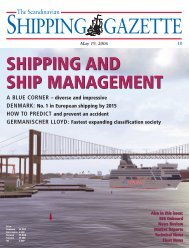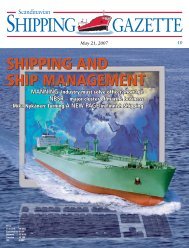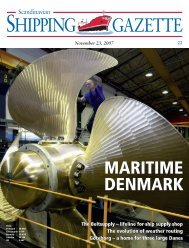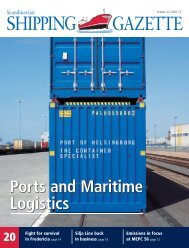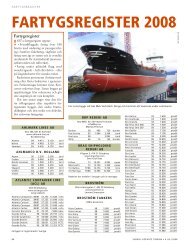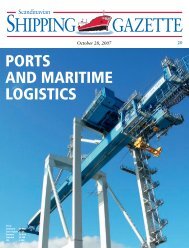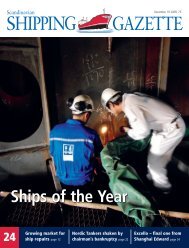SSG No 4 - Shipgaz
SSG No 4 - Shipgaz
SSG No 4 - Shipgaz
You also want an ePaper? Increase the reach of your titles
YUMPU automatically turns print PDFs into web optimized ePapers that Google loves.
Master Mariner<br />
or Master Criminal?<br />
Mark Twain once wrote “sailing is like<br />
being in jail, but with the added<br />
opportunity of drowning”. Captain<br />
Larsen has tried the correctness of<br />
that statement the hard way, and<br />
unfortunately, his encounter with the<br />
American Department of Justice is not<br />
an isolated experience.<br />
❯<br />
Over the past years, developments<br />
show a trend where a criminal charge<br />
against the individual seafarer has become<br />
the prosecutor’s tool of choice in order to<br />
attend to safety, security and environmental<br />
issues. Accidents, especially those<br />
involving oil spill, result in not only liability,<br />
but also in criminal investigation. It is<br />
widely accepted that any deliberate actions<br />
that result in pollution, injury to life,<br />
industry and the environment should be<br />
taken seriously, but in many cases, a criminal<br />
investigation is initiated even if an<br />
error in navigation or management of the<br />
vessel caused the incident. According to<br />
those who advocate this, the aim is to discourage<br />
others as well as punish the wrongdoer.<br />
In his interview, captain Larsen criticizes<br />
Birgitta Hed of the Swedish Club.<br />
the owners of the Danica White for the<br />
meagre assistance in his precarious situation,<br />
and instead praises his union, the<br />
Maritime Leaders, for all their efforts.<br />
Since the P&I does not cover costs and<br />
fines deriving from a criminal charge, an<br />
experience like captain Larsen’s can be a<br />
costly occurrence for all involved.<br />
Birgitta Hed, Deputy Area Manager at<br />
the Swedish Club, therefore stresses the<br />
importance of a contingency plan for the<br />
ship owner on how to handle criminal<br />
investigations, so that all functions<br />
involved – the owner, management and<br />
crew – are aware of their rights and obligations<br />
and how to avoid additional charges<br />
of obstruction of justice.<br />
Rewarding the whistle blower<br />
A policy well known to all employees will<br />
also serve another purpose. Birgitta Hed<br />
relates to the American authorities’ campaign,<br />
where a “whistle blower” is entitled<br />
to a percentage of the fine imposed if they<br />
tell their side of the story. A well informed<br />
crew that feel the support of their employer<br />
will less likely end up as a hostile witness<br />
in a crime investigation, but instead work<br />
with the company in improving routines<br />
and preventing accidents.<br />
A fully implemented Safety Management<br />
System (SMS) is the backbone in loss<br />
prevention at sea and can of course be<br />
helpful in any investigation. However,<br />
when prosecutors exploit the information<br />
from incident reports to nail the crew or, as<br />
in some cases, the shore based Designated<br />
Person (DP), there may be a risk that the<br />
already scarce reporting is curbed even<br />
more. The focus shifts from lessons to be<br />
learned to finding fault and a scapegoat;<br />
the opposite of what International Safety<br />
Management sought to achieve. There<br />
have also been cases where people, on the<br />
advice of their lawyers, entirely refuse to<br />
speak to investigators of an incident, thus<br />
comprising truth and transparency.<br />
Birgitta Hed believes this trend is clearly<br />
counterproductive and that it may result in<br />
suppressed incident reporting, among other<br />
things.<br />
Similarly, Peter Jodin, who is Safety<br />
Manager at Wallenius Marine, thinks that<br />
people onboard will think both once and<br />
twice before reporting accidents and near<br />
misses. Wallenius Marine has not had an<br />
We will not leave any<br />
of our boys or girls behind.<br />
incident like this yet but Captain Jodin<br />
feels confident they know how to react<br />
when and if it happens.<br />
“We will not leave any of our boys or<br />
girls behind”, says Peter Jodin.<br />
If ever in the situation, Wallenius<br />
Marine will set their P&I and local agent to<br />
work to arrange with legal assistance. Even<br />
if in the end the P&I will not cover the<br />
charges, the person accused is innocent<br />
until proven guilty and will get all necessary<br />
assistance.<br />
Written policy on the way<br />
At Transatlantic, they are equally prepared<br />
for the worst. A written policy is on its way<br />
out to the ships and the issue was recently<br />
discussed at a conference with the company’s<br />
senior officers and engineers. The concept<br />
is the same.<br />
“Transatlantic will immediately contact<br />
our insurance companies and use their<br />
expertise to arrange for legal assistance and<br />
to raise a possible bail”, says Lars Holmberg,<br />
Technical Manager at Transatlantic.<br />
Experience has shown that both guilty<br />
and innocent seafarers are caught in criminal<br />
investigations, often with great harm<br />
done, both personally and economically,<br />
before a decision is made. With today’s<br />
shortage of quality seafarers, the trend to<br />
criminalize the seafarer may possibly act as<br />
a deterrent to those interested in a seagoing<br />
career. Who wants to take up the<br />
challenge of becoming the company’s DP<br />
or accept the position as captain or chief<br />
engineer, if the risk at stake involves<br />
prison?<br />
cecilia österman<br />
SCANDINAVIAN SHIPPING GAZETTE • FEBRUARY 23, 2007 15


